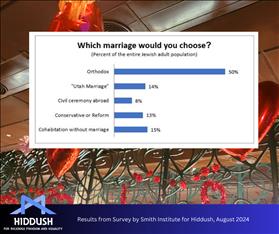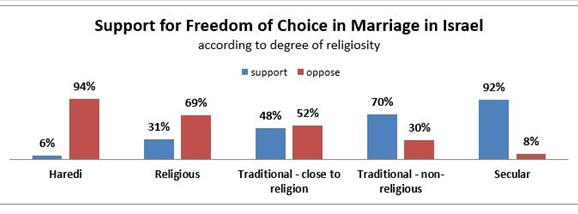Half of the Israeli Jewish Public Prefer to Marry in a non-Orthodox Marriage Ceremony
A survey by the Smith Institute for Hiddush ahead of the 15th of Av: two-thirds of the Jewish public in Israel support legislation that would abolish the Orthodox monopoly on marriage and allow freedom of marriage in Israel. This includes 68% of Likud voters and 41% of the voters of Religious Zionism and Otzma Yehudit parties. If they had a choice - only 15% of the secular public would marry in an Orthodox marriage
19/08/2024 12:58
Tags: freedom of marriage · Tu B’Av · Utah marriages · Hiddush

Which Marriage would you choose?
It's a bittersweet day in Israel today. It's Judaism's holiday of love that often marked a pause for love, consolation, and joy in the midst of pain and persecution. It is celebrated in Israel even as we are still facing the threat of war and the pain of the hostages and their families as we strive to gain their release. It is known as an auspicious day for celebrating weddings, and on this day we are sharing with you a new survey we commissioned in order to gauge the views of Israeli Jews on the subject of marriage.
67% of the Jewish public in Israel support the recognition by the state of all types of marriage, including civil, Conservative and Reform marriages. Among the secular public 92% support it, and even 31% of those who define themselves as religious do so. These are the findings of a survey conducted by the Smith Research Institute for Hiddush – for Religious Freedom and Equality in preparation for Tu B’Av, the Jewish holiday of love.
Hiddush has been examining the public's position on the issue of freedom of marriage since its inception. The latest survey once again reinforces the conclusion that this is a majority that has been consistent and stable since 2010 (within the margin of sampling error]. The survey was conducted in early August 2024 among an expanded sample of 800 people that is a representative sample of the adult Jewish population In Israel (sampling error ± 3.5%).
67% of the Jewish public in Israel support the recognition by the state of all types of marriage
Most voters for the coalition parties support the freedom of choice in marriage: 68% of Likud voters and 41% of Religious Zionism and Otzma Yehudit parties’ voters in the most recent elections.
The survey also examined public attitudes towards "Utah marriages," an official online marriage platform pioneered by Utah County that allows couples from Israel and around the world to marry in the state of Utah, USA, without leaving their home country. Over a year ago, the Israeli Supreme Court upheld Hiddush’s position and rejected that of the Interior Ministry, ruling that the Population Authority must register as married any couple married via the Utah online option. The survey assessed both the awareness of Israelis about this marriage alternative and their level of support for it.
According to the survey results, a majority of the Jewish public (69%) are unaware that it is possible to have a civil marriage in the United States without leaving Israel. The question presented this option to the sample, and the findings show that most adult Jews in Israel (66%) support this option [45% had not heard of it before but support it, while 21% had heard of it and support it]. 34% are opposed [24% had not heard of this option but expressed opposition based on the description provided, and 10% had heard of the option and oppose it].

Support for freedom of choice in marriage according to vote in 2022 elections
Another question posed in the survey was: "Assuming that all options were available and equally recognized by law, if you or one of your children were to marry, which framework would you choose for the marriage?" According to the survey findings, only 50% of the Jewish public would choose Orthodox marriage, 22% would opt for civil marriage [8% – civil marriage abroad, and 14% – "Utah marriages"], 13% would opt for Conservative or Reform marriage and 15% would choose cohabitation without marriage.
The significance of this data is particularly evident when looking at the preference of the secular public. While 98% of Haredim and 87% of religious Jews would choose Orthodox marriage, only 15% of secular Jews would do so. Among immigrants from the former Soviet Union, only 14% prefer to marry in in an Orthodox manner.
13% express a preference for Reform or Conservative marriages for themselves or their children, a significant percentage that reflects the broad interest in non-Orthodox religious services among the Jewish public. A closer look at the breakdown of these responses provides further insights, potentially offering a clue to outreach opportunities for these movements. This preference is expressed by 22% of the secular public, 13% of the traditional but non-religious public, 18% of immigrants from the former Soviet Union, 23% of voters for the National Unity party, 25% of Labor/Meretz voters, and 20% of Yesh Atid voters. It is also noteworthy that 16% of women prefer this option, compared to only 10% of men.
Another noteworthy phenomenon is the distinction between the views of women and men
Most voters for the coalition parties support the freedom of choice in marriage
on these issues, and the reasons for this are apparent. Only 44% of women would prefer to marry in an Orthodox ceremony, compared to 55% of men. While 72% of women in the adult Jewish population support freedom of choice in marriage, only 62% of men share this view. Similarly, 73% of women support Utah marriages, compared to 59% of men.
The stance of the Jewish public in Israel is clear: a large majority rejects the policies of Israeli governments that have succumbed to the blackmail of the ultra-Orthodox parties since the founding of the state, and imposed the authority of the Orthodox Rabbinate on the entire Jewish public. The irony is that the Rabbinate has managed to alienate tens of thousands of couples from the institution of marriage, leading them to prefer cohabitation without formal marriage. Thus, the Rabbinate has become the greatest threat to the institution of marriage in Israel. Since its establishment, Hiddush has fought to promote freedom of choice in marriage and divorce and to abolish the monopoly of the anachronistic Chief Rabbinate. The events of the judicial overhaul and the government's conduct on religious matters since the war give hope that in the next elections, the public will express its preference by supporting only those parties that commit to implementing the principles of freedom of religion and conscience, as guaranteed in the Declaration of Independence, including the introduction of civil marriage and divorce, befitting a truly Jewish and of choice in marriage according to degree of religiousity.

Support for freedom